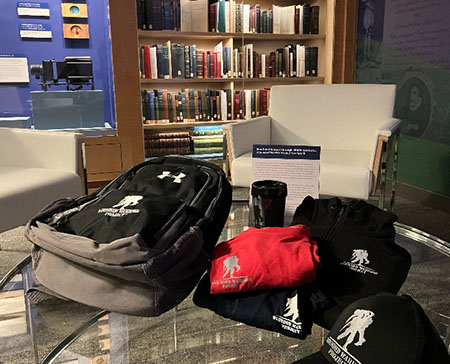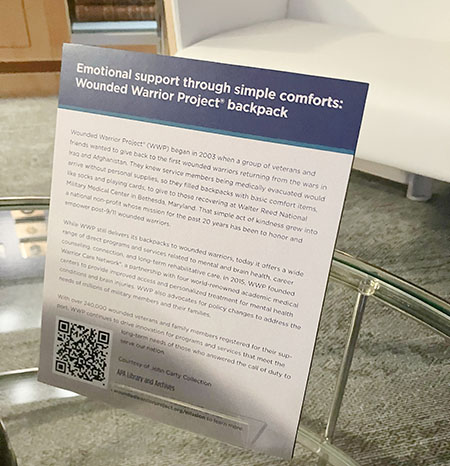American Psychiatric Association Foundation Exhibit Features Wounded Warrior Project

A simple black backpack sat inside a library in Washington, DC, nestled among historical artifacts and personal archives. Although it might be something often overlooked, this backpack carries the weight of a profound history, — a symbol of hope and support for those who have sacrificed for our country.
The backpack has a white logo on the front, depicting a warrior carrying another off the battlefield. It is the crest for Wounded Warrior Project® (WWP). This bag was prominently displayed inside the American Psychiatric Association (APA) Melvin Sabshin, M.D., Library and Archives, as part of an exhibit to explore the rich history of military psychiatry and veteran mental health.
The exhibit, which opened in November 2023 and ran through January 2024, highlighted WWP's pivotal role in the evolution of veteran mental health care. It also paid tribute to the country's ongoing commitment to developing support systems for military members facing mental health challenges.
“Wounded Warrior Project applauds the American Psychiatric Association, a national leader in mental health awareness and education, for their commitment to elevating public understanding about the importance of psychological care for our nation's veterans,” said John Eaton, vice president of Complex Care at WWP.
APA and WWP have collaborated in recent years to raise awareness about the mental health needs of veterans and find opportunities to advance care for those who served.
In 2022, the organizations held a joint interactive livestream that shed light on veteran mental health. Veteran and psychologist Dr. Sean Wilkes hosted the event alongside Dr. Erin Fletcher, WWP director of Warrior Care Network®, and warrior Richard Dorr. In 2023, the APA Foundation featured Dr. Fletcher and warrior Tonya Oxendine in an article New Ways of Healing: Military Psychiatry and Veterans’ Mental Health.

The description next to the backpack on display in the APA Library reads:
Emotional support through simple comforts: Wounded Warrior Project® backpack
Wounded Warrior Project® (WWP) began in 2003 when a group of veterans and friends wanted to give back to the first wounded warriors returning from the wars in Iraq and Afghanistan. They knew service members being medically evacuated would arrive without personal supplies, so they filled backpacks with basic comfort items, like socks and playing cards, to give to those recovering at Walter Reed National Military Medical Center in Bethesda, Maryland. That simple act of kindness grew into a national non-profit whose mission for the past 20 years has been to honor and empower post-9/11 wounded warriors.
While WWP still delivers its backpacks to wounded warriors, today it offers a wide range of direct programs and services related to mental and brain health, career counseling, connection, and long-term rehabilitative care. In 2015, WWP founded Warrior Care Network®, a partnership with four world-renowned academic medical centers to provide improved access and personalized treatment for mental health conditions and brain injuries. WWP also advocates for policy changes to address the needs of millions of military members and their families.
With over 240,000 wounded veterans and family members registered for their support, WWP continues to drive innovation for programs and services that meet the long-term needs of those who answered the call of duty to serve our nation.
Expanding its commitment to mental health
In January 2024, WWP announced another $100 million investment into veteran mental health care. WWP funding for Warrior Care Network also supports research in virtual reality, repetitive transcranial magnetic stimulation, artificial intelligence, and more to improve treatment for mental health and traumatic brain injuries.
While there is progress in treating the psychological needs of veterans, the work is far from done. Mental health needs are 3 of the 4 most common health issues among WWP warriors. Learn more about warrior mental health and read stories about the many paths to healing.
Contact: Kaitlin Fohlin, Public Relations, kfohlin@woundedwarriorproject.org, 904.776.7169
About Wounded Warrior Project
Since 2003, Wounded Warrior Project® (WWP) has been meeting the growing needs of warriors, their families, and caregivers — helping them achieve their highest ambition. Learn more.